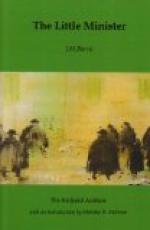At the roar, as they thought, of the cannon, the farmers looked up from their struggle with the flood to say, “That’s Rintoul married,” as clocks pause simultaneously to strike the hour. Then every one in the glen save Gavin and myself was done with Rintoul. Before the hills had answered the noise, Gavin was on his way to the Spittal. The dog must have been ten minutes in overtaking him, yet he maintained afterward that it was with him from the start. From this we see that the shock he had got carried him some distance before he knew that he had left the school-house. It also gave him a new strength, that happily lasted longer than his daze of mind.
Gavin moved northward quicker than I came south, climbing over or wading through his obstacles, while I went round mine. After a time, too, the dog proved useful, for on discovering that it was going homeward it took the lead, and several times drew him to the right road to the Spittal by refusing to accompany him on the wrong road. Yet in two hours he had walked perhaps nine miles without being four miles nearer the Spittal. In that flood the glen milestones were three miles apart.
For some time he had been following the dog doubtfully, for it seemed to be going too near the river. When they struck a cart-track, however, he concluded rightly that they were nearing a bridge. His faith in his guide was again tested before they had been many minutes on this sloppy road. The dog stopped, whined, looked irresolute, and then ran to the right, disappearing into the mist in an instant. He shouted to it to come back, and was surprised to hear a whistle in reply. This was sufficient to make him dash after the dog, and in less than a minute he stopped abruptly by the side of a shepherd.
“Have you brocht it?” the man cried almost into Gavin’s ear; yet the roar of the water was so tremendous that the words came faintly, as if from a distance. “Wae is me; is it only you, Mr. Dishart?”
“Is it only you!” No one in the glen would have addressed a minister thus except in a matter of life of death, and Gavin knew it.
“He’ll be ower late,” the shepherd exclaimed, rubbing his hands together in distress. “I’m speaking o’ Whinbusses’ grieve. He has run for ropes, but he’ll be ower late.”
“Is there some one in danger?” asked Gavin, who stood, he knew not where, with this man, enveloped in mist.
“Is there no? Look!”
“There is nothing to be seen but mist; where are we?”
“We’re on the high bank o’ the Quharity. Take care, man; you was stepping ower into the roaring water. Lie down and tell me if he’s there yet. Maybe I just think that I see him, for the sicht is painted on my een.”
Gavin lay prone and peered at the river, but the mist came up to his eyes. He only knew that the river was below from the sound.
“Is there a man down there?” he asked, shuddering.
“There was a minute syne; on a bit island.”




